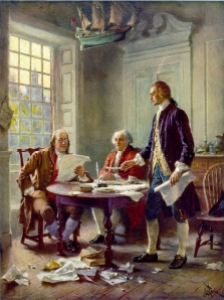It symbolizes equality, undermining the target society’s ability to maintain property rights.
Gay marriage isn’t about marriage contracts between homosexuals.
We know this because homosexual marriage is unpopular among homosexuals. Pew Research states that, in all the states surveyed since 2004, only 71,165 gay marriages have been performed. Census data shows that even in California, where 1.3 million estimated homosexuals live, a scant 18,000 gay marriages have occurred.
Yet some of the most expensive advertising time in the country — during the 2014 Grammy awards, which sold for $1m per 30 second spot — spent an entire segment on promoting gay marriage. The entire segment ran for roughly 7 minutes and 30 seconds. Although not exact, we can say that it’s equivalent to over $15 million in prime ad spending, endorsed by multiple celebrities, packaged with official approval on a broadcast network granted many Federal privileges and censored by the Federal Communications Commission.
This provocation comes a year after the FCC relaxed its obscenity policies after the Supreme Court overturned some indecency cases.
In this, ironically, we see the results of years of misguided libertarian activism that would have been predicted by a classically educated elite but would only be poorly understood by today’s à la carte university graduates.
While state censorship is a brittle method of managing public mores, the law also mandates that television manufacturers receive broadcast TV signals. Cable and Satellite TV operators are similarly obligated to carry those signals by the law. In this way, state censorship is the only means available (besides abstaining from using television) for the general population to regulate the limits of what media can be sent to their homes.

The patriarchal family is properly understood as a unit supportive of the private property political order, headed by a single executive. Aristotle defined this explicitly in contrast to the society formed around Plato’s ideals of love, especially homosexual love, as exemplified by Achilles’ passion for Patroclus.
Homosexual love is a symbol of equality in that, in the act, it connects two entities that are closer to being the same. Sex between men and women is a conjugation of two inherently unequal beings. Attempting to portray men and women as ‘equals’ requires a lot of continual rhetorical bluster to obscure the obvious reality. Holding up homosexual love as moral paragon comes naturally to egalitarians, because it matches with their political conceptions (which prizes the mental unreality of ideal forms over nature).
Since the convulsions of 1968, the West has flung itself into a Platonist concept of love (in a vulgar form), which is seen as the highest value, even among heterosexuals.
The Aristotelian view is that patriarchy leads to the private property hierarchical social order. There are thousands of years of evidence behind the proposition that patriarchy is the critical cultural bulwark that promotes a politics of private property. Plato agreed on this point. The Communists agree on this point, and as such, advance social orders that undermine patriarchy, because it’s known that it’s the atom of the private property social order.
Merely because an atom can be split doesn’t mean that it ought to be, because doing so eliminates its essential characteristics.
It’s because of this that the left is so aggressively attacking the remnants of patriarchal social order that remains within the Western world. Each destroyed family is a victory for the parasitical forces that make up the left. The distributed hierarchical structure is what makes complex political and economic forms possible. Enabling laws like divorce make that structure legally insecure, and simple to predate upon.
It’s at split purposes to say that a private property legal order is ideal while simultaneously agitating against the distributed hierarchy of secure social order known as the patriarchal family.
For the left, it’s more fruitful to attack ‘the economy’ (which etymologically derives from ‘the household’) than it is to attack larger social units. An egalitarian family structure leads to an egalitarian political structure, which is what the West has been hurtling towards since the mid 18th century, to our detriment.
All the left needs is love, love, love, unrestricted erotic love free of obligations, to achieve its ends in the destruction of civilization. The essential practice of the left is to apply a deadly herbicide to the complicated, evolved balance between flora and fauna that make up human civilization. Then, planners attempt to erect wobbly structures over the salted flats in accordance to their visions of how the world ought to be.
For a deeper contemporary perspective on this issue, Quick Reactions recommends the writings of Dalrock on love.

